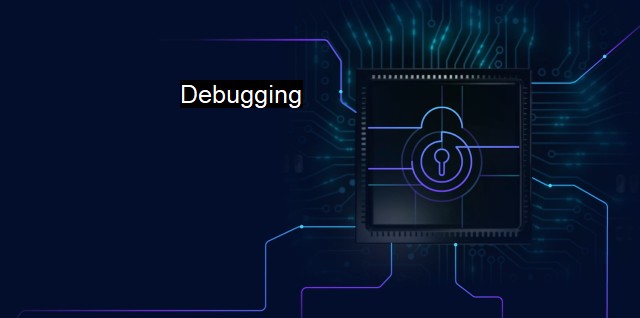What is Debugging?
Enhancing Cybersecurity Integrity: The Critical Role of Debugging in Cybersecurity and Antivirus Therapy
Debugging is a critical process in the development and maintenance of software, and when it comes to cybersecurity and antivirus applications, the importance of this procedure escalates significantly. Defined simply, debugging is a systematic process used to locate, identify, analyze and repair coding errors in the system or software. when it comes to cybersecurity and antivirus, debugging has an even wider scope and demanding role as it cannot only fix coding errors but also resolve security threats.While software programming entails developing various algorithms, data structures, and functions to make a software functional and all-encompassing for end-users, human error or complexities surrounding developing advanced software can lead to bugs. Bugs can appear in different facets of software, occurring as syntax, logical, or semantic errors.
In the foreground of cybersecurity and antivirus, debugging assumes the role of a measure to make systems resilient against external attacks. Bugs make the system vulnerable, allowing malicious entities to exploit these shortcomings, leading to devastating intrusions, malfunctioning, data theft, and more. A small error can lead to doors wide open for cyberattacks, largely emphasizing effective and meticulous debugging practices.
Most attackers employ techniques, such as malware, ransomware, phishing, denial of service, among others, to infiltrate. Inadvertently, a chunk of these rely on software vulnerabilities, bugs, or exploits to make their way into the system. The role of debugging, in this context, becomes invaluable. When programmers debug the software, they implicitly close the loopholes that can be used as infiltrations in the software, compromising the security panorama.
Antivirus applications rely heavily on debugging for their functionality, especially when combating complex malware. An antivirus is a security utility designed to detect, quarantine, and eliminate threats emanating from harmful code or applications. Without debugging, familiarization with each foreign harmful code, its interdisciplinary impacts, would not be graspable. Debugging permits knowing the payload (intended impacts) of any code snippet, its functionality, and allows researchers to initiate crafting the appropriate response.
Crucial to cyberspace's health, debugging not only enhances the system's capabilities and response to threats, but it also provides quality assurance for the implemented software. This process ensures that a piece of software is free from abnormal behaviors and vulnerabilities to craft a safe and secure interaction space.
In the ever-developing world of cybersecurity, debugging may also provide the benefits of predictive analytics. As certain kinds of bugs, defective patterns, and vulnerabilities appear with a higher frequency, developers may eventually find themselves in situations when fixing an immediate bug equips them with invaluable experience to tackle or forefend similar problems in future iterations.
While in the conventional understanding of programming, debugging serves a pivotal role to fix bugs, the paradigm shift towards a more intertwined, connected, and risk-laden domain like cybersecurity amplifies its significance. A bug in a routine software might impair its normal functioning; a bug in cybersecurity and antivirus could lead to the potential collapse of an organization. Hence robust debugging underlies the strength of these systems, extending beyond simple error identification and bug fixing to observing and painting a wider picture of cyber threats attempting to penetrate an otherwise secure system.
Given the scenarios where online potential threats are always seeking new weaknesses to exploit in the software environment, it becomes the utmost priority of developers to ensure their code is hard, resilient, and impregnable through the meticulous debugging process. debugging makes cybersecurity measures such as antivirus more effective, thereby ensuring robust cyber health and safety measures.

Debugging FAQs
What is debugging?
Debugging is the process of identifying and fixing problems or errors in computer software, hardware, or systems. It involves analyzing and testing software to determine the root cause of a problem, and then developing and implementing a solution to fix it.Why is debugging important in cybersecurity and antivirus?
Debugging is crucial in cybersecurity and antivirus because it helps to identify and resolve security vulnerabilities and bugs in software. Without debugging, vulnerabilities and bugs can go unnoticed, creating opportunities for cybercriminals to exploit them to gain unauthorized access, steal data, or cause other damages.What are some common debugging tools used in cybersecurity and antivirus?
Some common debugging tools used in cybersecurity and antivirus include debuggers, log analyzers, network sniffers, and memory dump analyzers. These tools help to identify and isolate problems in the code, track system activity, and analyze memory usage to pinpoint the source of errors or vulnerabilities.How can I improve my skills in debugging for cybersecurity and antivirus?
To improve your skills in debugging for cybersecurity and antivirus, you can take courses or certifications in programming, cybersecurity, and software testing. You can also participate in online forums or communities focused on debugging and antivirus research. Additionally, practicing with real-world scenarios and experimenting with different tools and techniques can help you develop your skills and become a better debugger.| | A | | | B | | | C | | | D | | | E | | | F | | | G | | | H | | | I | | | J | | | K | | | L | | | M | |
| | N | | | O | | | P | | | Q | | | R | | | S | | | T | | | U | | | V | | | W | | | X | | | Y | | | Z | |
| | 1 | | | 2 | | | 3 | | | 4 | | | 7 | | | 8 | | |||||||